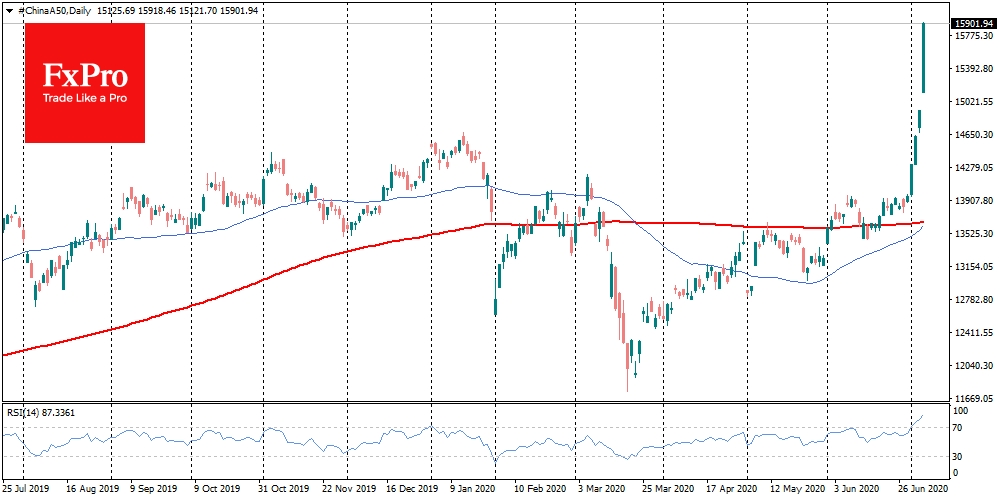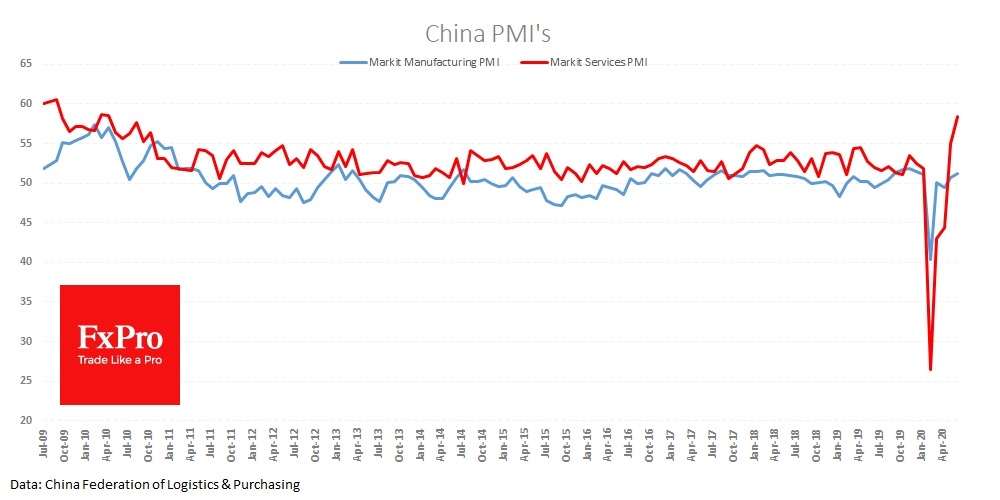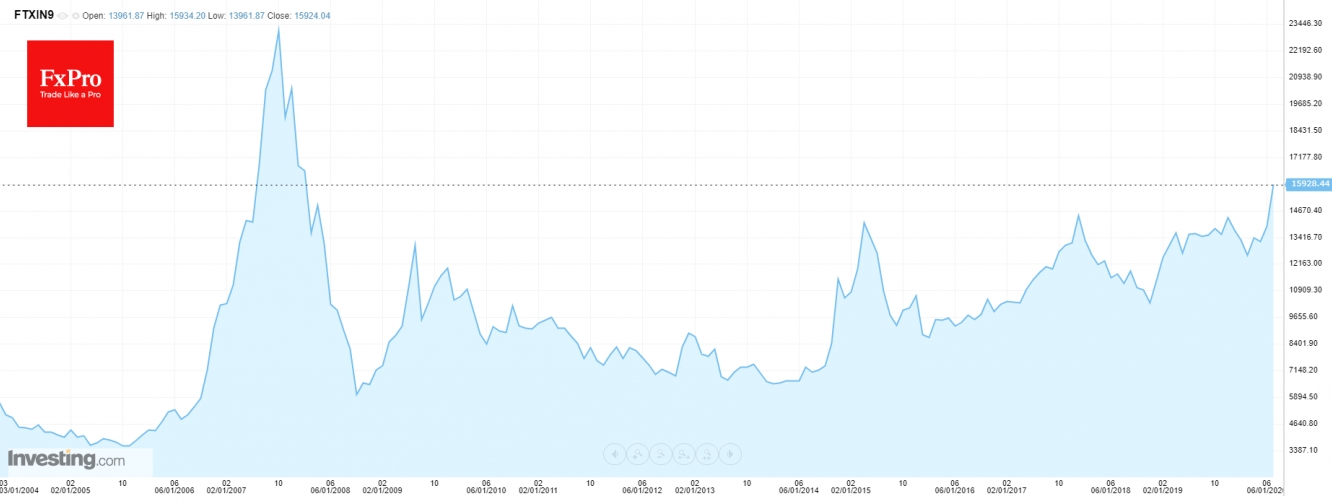The stock rally in Chinese markets continues to gain momentum. China A50, the blue-chip index of the Shanghai Stock Exchange has soared 5.7% since the beginning of the day after growing 8% last week. These are the highest levels for China A50 since March 2008, and it clearly shows the change in the disposition of investors who suddenly fell in love with Asia. 
The growth of the Chinese market is also pulling the Nikkei 225, which is up 2% this morning, although it ignored the Chinese market rally in the previous two weeks. Futures on American indices are also rising. Nasdaq once again updates records, ascending to 10500. The S&P 500 and Dow Jones are also showing growth, but this is a pale shadow compared to the growth in China.
To some extent, the situation reminds us of what happened in the markets in 2007 and early 2008. Investors are paying attention to markets outside the U.S., increasing their share in Asian assets.
Now, the main investment idea is a more decisive recovery of the Chinese economy, which not only stopped the decline but has already started the recovery, judging by PMI indices published last week. All this coincided with the quarterly portfolio rebalancing. The markets of those countries that have managed the coronavirus better are looking more and more advantageous. This has allowed the economy to reopen more quickly and has done less harm to business and consumer activity.
The U.S. has very high daily cases of coronavirus, with a 7-day average of 50,000. The total number there is approaching 3 million, of which more than half are active cases (one-third of the global number), which limit officials to lift restrictions and forces to return them in some cases. Politicians are now imposing restrictions more precisely, avoiding a national lockdown. However, this keeps businesses and consumers from fully returning to normality.
Under such conditions, the U.S. monetary authorities will continue to flood the markets with liquidity to support the national economy and avoid a financial crisis. However, since the dollar is the world's reserve currency, it also increases liquidity for all markets, as the tide lifts all the boats at once.
As in 2007-08, investors use monetary easing and consumer stimulation in the U.S. to buy shares of regions with potentially the highest economic growth. In early 2008 this idea sounded like 'decoupling'. It was based on purchases of commodities and shares of EM countries standing aside from the mortgage banking crisis. However, one should also remember the lessons of October 2008, when the world was taught a very painful lesson about how interconnected the global financial system is.
The tipping point came when it became clear that the Fed's policy easing was not enough to fill the growing abyss with money. Right now, the U.S. central bank is coping with the task. But it is important to remember that the situation can change at any time and without warning. For investors, this means that the rally in the Chinese market and increased purchases of commodity assets can continue as long as the Fed manages to fill the entire global financial system with money. But will it always be like this?
The FxPro Analyst Team
- English (UK)
- English (India)
- English (Canada)
- English (Australia)
- English (South Africa)
- English (Philippines)
- English (Nigeria)
- Deutsch
- Español (España)
- Español (México)
- Français
- Italiano
- Nederlands
- Polski
- Português (Portugal)
- Português (Brasil)
- Русский
- Türkçe
- العربية
- Ελληνικά
- Svenska
- Suomi
- עברית
- 日本語
- 한국어
- 简体中文
- 繁體中文
- Bahasa Indonesia
- Bahasa Melayu
- ไทย
- Tiếng Việt
- हिंदी
How The U.S. Monetary Policy Is Fueling Rally In China's Stocks
Published 07/06/2020, 05:24 AM
How The U.S. Monetary Policy Is Fueling Rally In China's Stocks
Latest comments
Loading next article…
Install Our App
Risk Disclosure: Trading in financial instruments and/or cryptocurrencies involves high risks including the risk of losing some, or all, of your investment amount, and may not be suitable for all investors. Prices of cryptocurrencies are extremely volatile and may be affected by external factors such as financial, regulatory or political events. Trading on margin increases the financial risks.
Before deciding to trade in financial instrument or cryptocurrencies you should be fully informed of the risks and costs associated with trading the financial markets, carefully consider your investment objectives, level of experience, and risk appetite, and seek professional advice where needed.
Fusion Media would like to remind you that the data contained in this website is not necessarily real-time nor accurate. The data and prices on the website are not necessarily provided by any market or exchange, but may be provided by market makers, and so prices may not be accurate and may differ from the actual price at any given market, meaning prices are indicative and not appropriate for trading purposes. Fusion Media and any provider of the data contained in this website will not accept liability for any loss or damage as a result of your trading, or your reliance on the information contained within this website.
It is prohibited to use, store, reproduce, display, modify, transmit or distribute the data contained in this website without the explicit prior written permission of Fusion Media and/or the data provider. All intellectual property rights are reserved by the providers and/or the exchange providing the data contained in this website.
Fusion Media may be compensated by the advertisers that appear on the website, based on your interaction with the advertisements or advertisers.
Before deciding to trade in financial instrument or cryptocurrencies you should be fully informed of the risks and costs associated with trading the financial markets, carefully consider your investment objectives, level of experience, and risk appetite, and seek professional advice where needed.
Fusion Media would like to remind you that the data contained in this website is not necessarily real-time nor accurate. The data and prices on the website are not necessarily provided by any market or exchange, but may be provided by market makers, and so prices may not be accurate and may differ from the actual price at any given market, meaning prices are indicative and not appropriate for trading purposes. Fusion Media and any provider of the data contained in this website will not accept liability for any loss or damage as a result of your trading, or your reliance on the information contained within this website.
It is prohibited to use, store, reproduce, display, modify, transmit or distribute the data contained in this website without the explicit prior written permission of Fusion Media and/or the data provider. All intellectual property rights are reserved by the providers and/or the exchange providing the data contained in this website.
Fusion Media may be compensated by the advertisers that appear on the website, based on your interaction with the advertisements or advertisers.
© 2007-2025 - Fusion Media Limited. All Rights Reserved.
